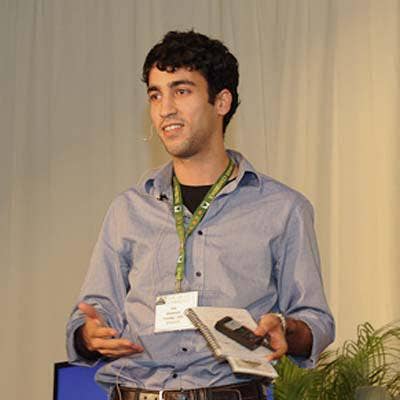The 10 Coolest Security Startups Of 2014 (So Far)

High-Profile Breaches Fuel Cybersecurity Venture Funding
Prominent retail data breaches and high-profile cyberespionage attacks against U.S. businesses have captured the attention of investors eager to get in on the early stages of an innovative cybersecurity startup. In 2013 early stage deals made up 47 percent of all global cybersecurity financing, according to New York-based CB Insights, which tracks venture funding. The research firm said the trend is continuing in 2014 with seed or Series A funding making up more than half (54 percent) of cybersecurity deals in the first three months of the year. These 10 innovative security startups have captured the attention of the security community in recent months. They address the demand for better incident response, monitor user privileges, and spot unusual system and user behaviors that could signal an attack.

Aorato
CEO: Idan Plotnik
Israeli startup Aorato developed a Directory Services Application Firewall aimed at examining all Microsoft Active Directory traffic for suspicious activity. The platform establishes a baseline of user behavior through Active Directory to detect a variety of threats, including pass-the-hash attacks, which enable an attacker to use a stolen password hash to log into a remote server rather than a plain-text password. It also can detect a mobile device or an attack on a file share that attempts to authenticate through Active Directory. Aorato came out of the cybersecurity unit of the Israeli military. The company emerged from stealth mode in January, announcing a $10 million Series B investment. Aorato's founders Idan Plotnik, CEO; Michael Dolinsky, vice president of research and development; and Ohad Plotnik, vice president of professional services; previously co-founded Foreity, a Microsoft security subcontractor acquired by IT services firm Aman Group in 2012.

Luminal
CEO: Josh Stella
Luminal, a Frederick, Md.-based startup that is developing a cloud infrastructure security and monitoring platform, is aiming to reduce software vulnerabilities and configuration weaknesses constantly plaguing Web-based services. The company will support Amazon Web Services users with its new platform, currently in beta. It embraces the DevOps movement to improve communication and resiliency in software and services by bridging the gap between software development and IT operations. Luminal's founder and CEO, Josh Stella, was the principal solutions architect at AWS and served eight years as the lead application architect at Dell. The platform is expected to be released later this year.

CounterTack
CEO: Neal Creighton
Waltham, Mass.-based security startup CounterTack is using the Cloudera Enterprise-based Hadoop cluster to detect attacks with its Sentinel platform. The company unveiled a formal channel program to attract resellers and consultancies that specialize in big data projects as well as large systems integrators. Sentinel collects behavioral data from endpoint agents deeply embedded in the Windows kernel to examine file and process behaviors. The company said in June that it raised an additional $5 million to extend its Series B financing round for a total of $20 million. Neal Creighton, president and CEO of CounterTack, co-founded and was president and CEO of GeoTrust, a digital certificate provider that was acquired through Symantec's $1.2 billion acquisition of VeriSign's digital certificate business in 2010.

Distil Networks
CEO: Rami Essaid
Arlington, Va.-based Distil Networks examines Web requests to protect websites by detecting and blocking bot activity aimed at them. The goal is to protect website content by blocking Web scraping, stop spam in Web forms and prevent click fraud. The company also maintains an active bot directory by examining and fingerprinting every Web crawler it encounters. Distil Networks raised $10 million in Series A Funding in May. Company co-founder and CEO Rami Essaid was founder of ChitChat Communications and has been active in the mobile, network security and infrastructure management markets. Distil co-founder and CTO Engin Akyol previously was a senior QA engineer at Riverbed Technology and a network testing engineer at Cisco Systems.

ThreatStream
CEO: Greg Martin
Redwood City, Calif.-based ThreatStream developed the SaaS-based Optic platform to map relationships between adversaries and targets and provide the threat intelligence data to support risk management decisions. Company founder and CEO Greg Martin announced in February a $4 million Series A funding round led by Google Ventures. ThreatStream hired Jason Trost, formerly a senior software engineer at security intelligence and analytics firm Endgame, as its senior analytics engineer. The goal is to build out the platform to provide real-time awareness of targeted attacks by analyzing unstructured data, such as chat activity in underground hacking forums with malware and threat indicators.

ThetaRay
CEO: Mark Gazit
Israeli security startup ThetaRay detects zero-day threats and advanced persistent threats that target critical infrastructure facilities. It developed the CriticalThreat Protectoin Platform to analyze data from sensors, database logs and transaction information to uncover suspicious communication systems patterns at industrial, telecommunications and financial institutions that may signal a threat, the company said. It can be deployed on-site or as a cloud-based service. CEO Mark Gazit was previously CEO of Nice Track, which provides software and hardware solutions to government agencies for threat intelligence. The company was co-founded by Amir Averbuch, a noted mathematician and big data analytics expert at Tel Aviv University.

Sentinel Labs
CEO: Tomer Weingarten
Palo Alto, Calif.-based Sentinel Labs raised $12 million for its next-generation endpoint security platform, which is now being beta-tested. It maintains a research and development team in Israel. The company said it doesn't use traditional signature-based technology to detect and block threats. Instead, it provides a form of application control, policy management and behavioral analysis to detect and prevent malware from executing on endpoint devices and servers. Early adopters testing the platform include Box, Netflix and Yahoo. The company has 20 employees and a research and development team in Israel.

Hexadite
CEO: Eran Barak
San Francisco-based startup Hexadite emerged out of stealth mode with an incident response platform that it says eliminates false positives to give responders the ability to investigate high-risk threats. The goal is to reduce manual intervention with its Automated Incident Response Solution (AIRS), which manages alerts from security systems by validating them and automatically remediating low-level threats. The company said it recently received an initial $2.5 million seed investment. Hexadite was founded by former military intelligence officers and private sector security experts. The platform can operate in fully automated or semi-automated mode. Hexadite CEO Eran Barak said organizations need to address broken response process by identifying and documenting the most efficient way to prioritize and address alerts and automating some of the steps to boost efficiency.

ZeroFox
CEO: James Foster
ZeroFox, based in Baltimore, attempts to identify active threats by monitoring outside factors such as social networking activity. It can spot and prevent social engineering attacks designed to impersonate a business' executives and alert security teams about suspicious activity. The company was formerly called Riskive. ZeroFox Asset Cloud discovers and catalogs social media accounts from marketing activity. Other components monitor for ongoing social engineering attacks by identifying social activity to detect the presence of impersonators to alert on potential scams. Company founder and CEO James Foster also founded Ciphent, a security services firm that was acquired by systems integrator Accuvant. The company recently added two senior sales executives from Intel Security (formerly McAfee) to head its enterprise and defense sector businesses.

Zimperium
CEO: Zuk Avraham
Israeli security startup Zimperium developed mobile intrusion prevention, employing packet monitoring to spot attempts to change device characteristics and assess applications and other processes on mobile devices to spot threats. The company, which has offices in San Francisco, also can detect man-in-the-middle attacks and other threats targeting sensitive data on the corporate network. Zimperium founder and CEO Zuk Avraham is a vulnerability expert, who created the company in 2012 as an Android penetration-testing framework. The company has raised $8 million from initial investors.